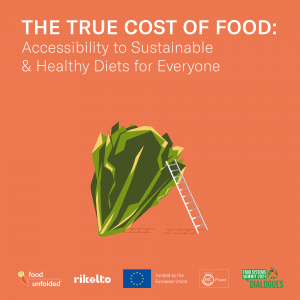Comentarios oficiales del Diálogo para la Cumbre de las Naciones Unidas sobre los Sistemas Alimentarios de 2021
Tipo de diálogo
Convocado por
Idioma del Diálogo
Fecha/hora
Para:
Ciudad
Enfoque geográfico
Formato
Por favor revise los detalles que encontrará más abajo para obtener información sobre cómo registrarse en el caso de que esté disponible o contacte al convocante si le gustaría asistir.
Administrador
Descripción
The Future:
Everyone of all socioeconomic backgrounds has access to a healthy, sustainable and affordable diet. Therefore, there is no need to differentiate between sustainable and unsustainable food production and consumption because all food is sustainably produced.
There is no more exploitation in supply chains. All actors get paid fair living wages and incomes, and have the economic capacity and are committed to reinvest in more long-term sustainable techniques and practices.
The Challenge:
For everyone to have access to a sustainable and healthy diet, we must simultaneously solve several food problems: end hunger, reduce inequalities in food access and distribution, and increase food yield for a growing world population, while drastically reducing the environmental impact of our agri-food system.
The Question:
How can we consider the environmental, social and human dimensions of value into food chains to make fair, healthy and sustainable food systems the new standard?
In this UN Food System Summit millennial dialogue, we discuss and explore:
- What is the role for (smallholder) farmers, businesses, and retailers further up in the food chains, governments/authorities, and consumers to achieve a more inclusive and just food production system?
- Which role can or should specifically the younger generations play within their organisations to make this happen?
- What are the biggest barriers for the different stakeholders to commit to these fair and sustainable practices?
- Could a ‘true cost’ food system, in which social and environmental costs are included, provide a global solution to unjust and unsustainable practices?
- How do we make sure all actors prioritise and commit to these environmental, social and human values, in a universal collaboration?
We will address these questions in 3 groups:
- The impact of the true cost of food on (smallholder) producers, farmers/producers government, industry/retailers, higher-income consumers and lower-socioeconomic consumers – in French
- The impact of the true cost of food on (smallholder) farmers/producers, government, industry/retailers, higher-income consumers and lower-socioeconomic consumers – in Spanish
- The impact of the true cost of food on (smallholder) farmers/producers, government, industry/retailers, higher-income consumers and lower-socioeconomic consumers – in English
Your View:
This dialogue invites you to share and hear different views on how we can let all actors along the food chains pay the true cost of food, to obtain a more healthy and sustainable food system. What is your personal perspective? In an open and evenly footed discussion, we’ll explore the barriers to achieving this sustainable food future, and how we can overcome them together.
Your voice in this dialogue is of great value for the agenda of the UN Food System Summit, taking place in New York City in September 2021. We will take notes during the dialogue – anonymous – and send our reports to the UN. By joining the Dialogue, you can help build a better future of food systems — a future that is strong, safe and fair for all.
In this dialogue, we focus on the millennial perspective. We welcome all voices in the age group between 20 to 40 years old. Please get in touch if you would like to join this dialogue!
Agradecimiento


